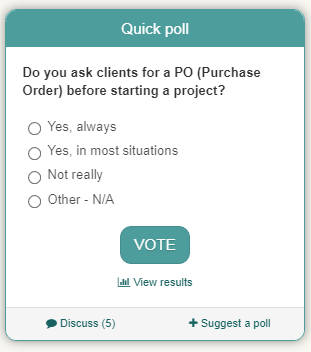A Purchase Order (PO) --or Project Order-- is a commercial document issued by a buyer to a seller, indicating types, quantities, and agreed prices for products or services the seller will provide to the buyer. Sending a project order to a supplier constitutes a legal offer to buy products or services. Acceptance of a project order by a seller usually forms a contract between the buyer and seller, so no contract exists until the project order is accepted.

On today's quick poll, freelancers are being asked whether they required a PO before starting a project or not.
So far 46.5%% of professional translators responded that they don't, 27.1% said that they require one in most situations, and only 18.8% answered that they always require a Project Order before starting a project. (See discussion »)
With the rise of TMS that include a project order step, it seems that creating a PO manually is not needed. And even when no TMS is used, linguists take email exchanges with PMs as a form of PO they can resort to in case of issues later on.
Truth is that, if a client is a long-standing customer, linguists feel POs are unnecessary as long as they agree on project details via email or even the phone. New clients are a different story though. Would you work for a new client on a trust basis? Would you start working on a project --big or small-- if you don't know how their accounting department works? Even some outsourcers with a very good reputation have had issues with payments in the past at least once. So, do you ask clients for a PO (Purchase Order) before starting a project? Think again. (And, please, check the Blue Board!)
Why are POs important in freelance translation?
Since issuing a PO constitutes a legal offer and accepting a PO constitutes an acceptance of such offer, including the conditions specified by the PO, project orders are in most cases the only proof of a commercial relationship between a buyer (translation outsourcer) and a seller (linguist). Just as contracts, written POs provide translators and outsourcers with a formal document that outlines in detail what is expected from each of them, how and when, and anticipates potential issues that may arise between both parties, providing specifications on how these will be solved. In sum, POs are a very useful tool to safeguard freelancers' and outsourcers' resources.

![]() POs allow freelancers and outsourcers to discuss the conditions and terms of a project in advance.
POs allow freelancers and outsourcers to discuss the conditions and terms of a project in advance.![]() Freelancers can use POs to claim payment of the services offered in case of non-payment issues.
Freelancers can use POs to claim payment of the services offered in case of non-payment issues.![]() POs help outsourcers, especially translation agencies, to keep track of their orders and payments.
POs help outsourcers, especially translation agencies, to keep track of their orders and payments.
What information should a PO include?
Ideally, every translation project order should include at least the following information:
- Outsourcer's details: full (real or company) name, address, primary and secondary phone numbers, primary and secondary email addresses, tax/business registration number and (digital) signature.
- Project order number: this could be any number, depending on the number of orders an outsourcer has issued. If the outsourcer is a direct client (not a company ), the translator may need to create the PO for them. In this case, the number will depend on the number of orders created by the translator.
- Service provider's details: full (real or company) name, address, primary and secondary phone numbers, primary and secondary email addresses, and tax/business registration number.
- Project name / denomination: this may be the name of the file that includes the project or else any name the outsourcer has chosen for the project (for example, "ENG>FRE_contract_I").
- Project files: the name of the file(s) included in the project. This helps the translator to know exactly what files to expect and let the outsourcer know if any file is missing when s/he starts working on the project.
- Project languages: both source and target language(es) involved, including language variants.
- Project volume: the total amount of source characters / words / lines / pages / the project contains or the total amount of hours that it will take the freelancer to complete the project.
- Project source and target formats: the original source file format and the file format expected to be delivered.
- Delivery deadline: date and time (including time zone) for project delivery.
- Software required (if any): any software needed for the performance of the task and required by the outsourcer (CAT tool name and version for example).
- Rate: it should be clarified whether the rate offered-accepted is per source or target character / word / line / page or if it is per hour.
- Rate total: the total amount to be paid to the freelancer based on volume and rate.
- Currency: the currency in which the rate is being set (Euro, USD, Pounds, etc.).
- Primary payment method: the payment method the outsourcer will use to transfer the money for the service to the service provider.
- Secondary payment method: an alternative payment method in case any issue arises with the use of the primary payment method.
Payment deadline: the date and time limit for the service provider to receive the outsourcer's payment. - Surcharges: a percentage or a value that will be added to the total amount (per day, for example) in case of late payment. Also, a specification of what party will absorb payment fees involved.
- Discounts: a percentage or value to be discounted from the total amount (this may be more common when large projects are involved).
- Invoicing instructions: any specific instructions regarding invoicing (name and email address of the person who will take care of issuing payment, for instance).
- Terms and conditions: any further terms and conditions in connection with the project and the business relationship (for instance, a non-disclosure agreement).
- Additional information/requirements: this section may include any type of information that may be useful or relevant to either the freelancer or the outsourcer, or to both (client's website URL, useful website URL(s), termbase or TM name, formatting guidelines, etc.)
Does this sound like too much? Maybe. We can't deny that Project Orders may still be one of the most important communication tools between clients and vendors, perfect instruments for preventing project issues at any stage.
PO vs. invoice
No. A PO is not an invoice. Some freelancers use invoices as POs and send these in advance. However, if an issue arises later (for example lack of full payment due to unrespected conditions), invoices may not represent concrete evidence for the agreement of project details between parties. Preferably, freelancers should send an invoice after the terms of a PO have been carried out.
Further tips
![]() Project orders may be accompanied by a separate, formal agreement stating that the acceptance of the PO from both parties represents a legal agreement.
Project orders may be accompanied by a separate, formal agreement stating that the acceptance of the PO from both parties represents a legal agreement.
![]() Project orders may be issued/requested as a separate file or as part of an email message (in the body of the email message).
Project orders may be issued/requested as a separate file or as part of an email message (in the body of the email message).
![]() Always store a copy of POs you issue or receive on your computer for future reference.
Always store a copy of POs you issue or receive on your computer for future reference.
Need help with creating POs? ProZ.com has a Service agreements service that allows you to create, send and track service agreements online, providing a formal document that outlines in detail what is expected from any client-service provider relationship. This service was released a few years ago, but staff is still adjusting the tool based on user feedback. Feel free to suggest improvements!
Need further help with assessing risks? Click here to learn how to screen potential clients and manage business risks.



